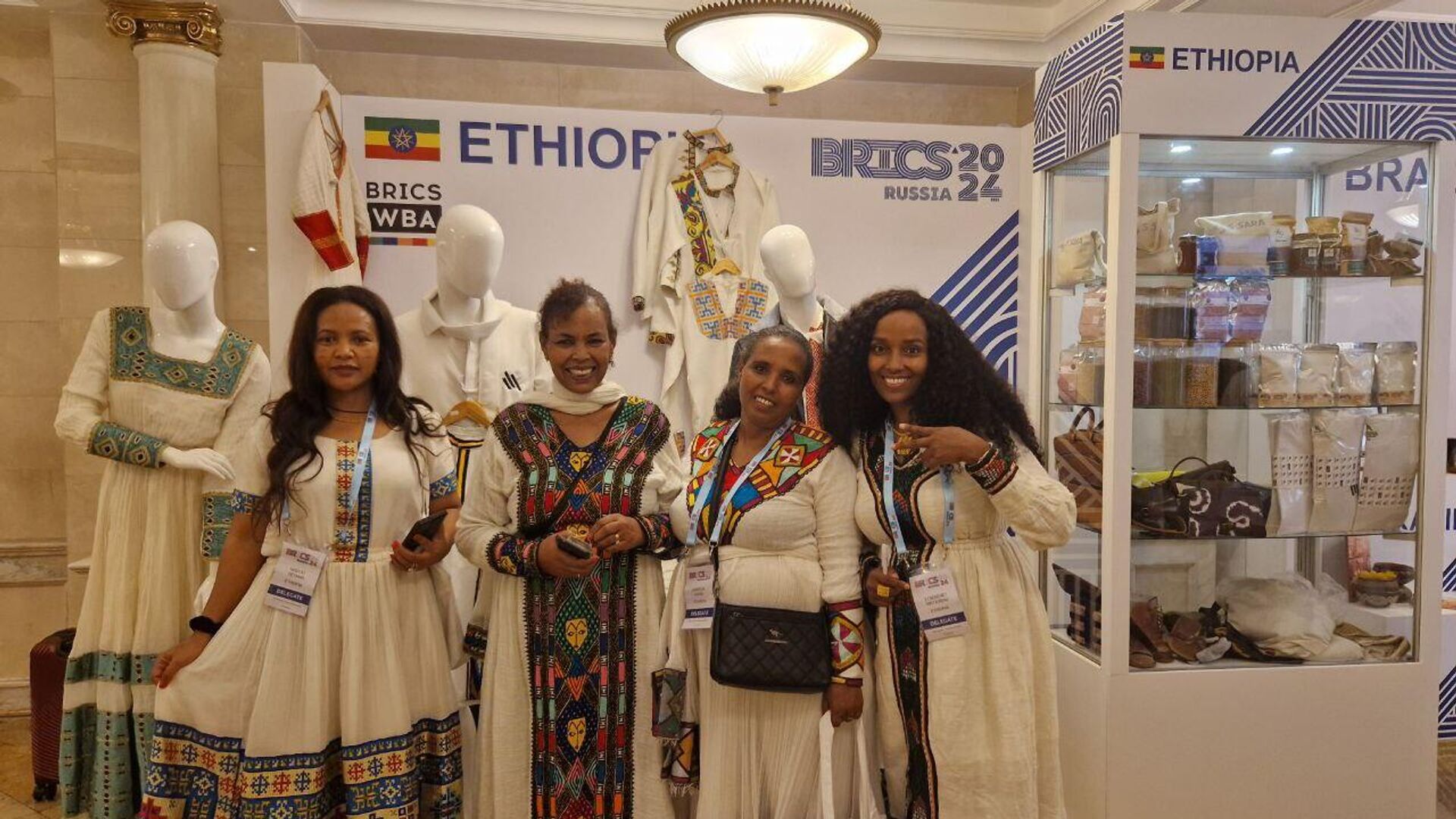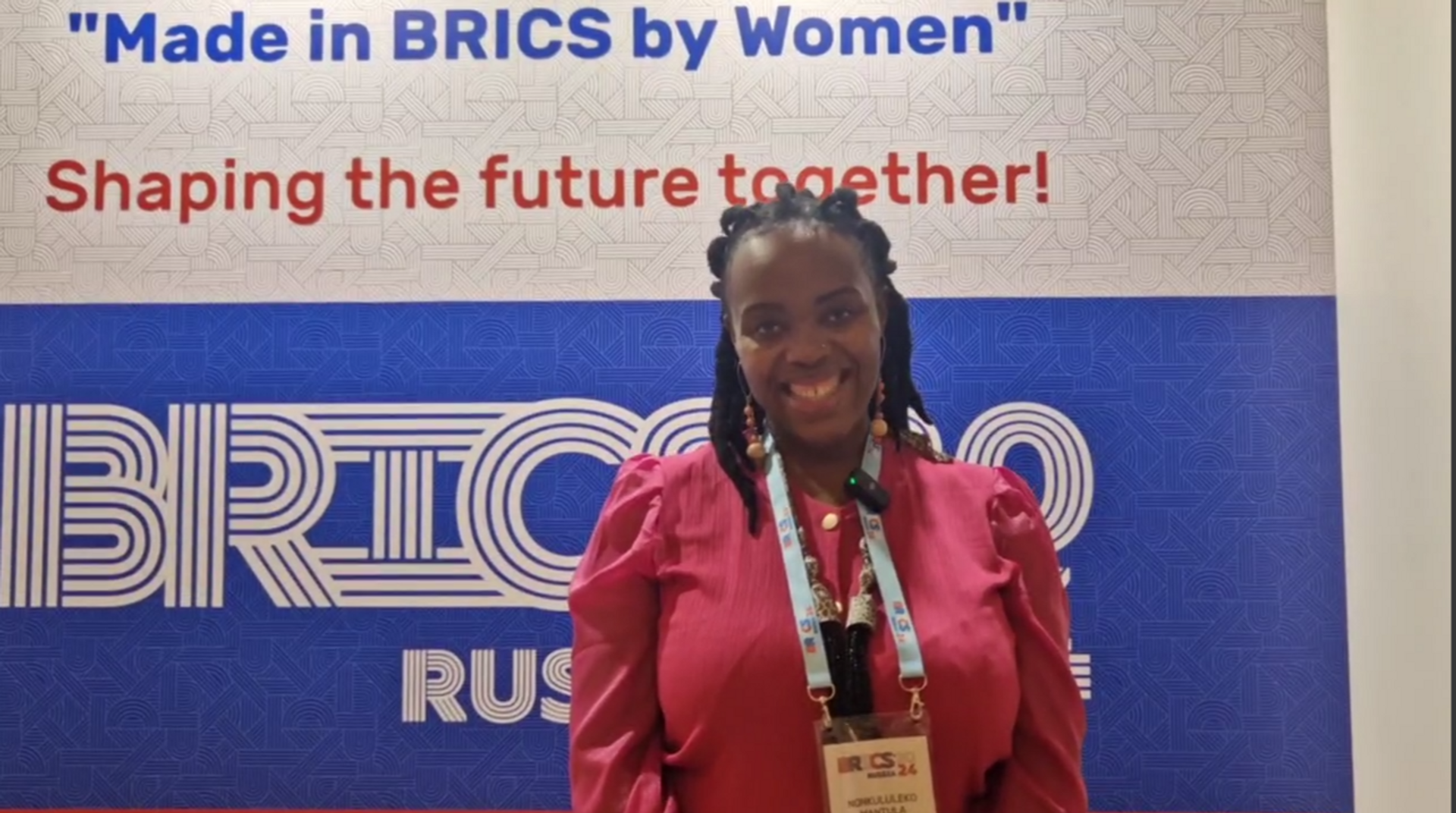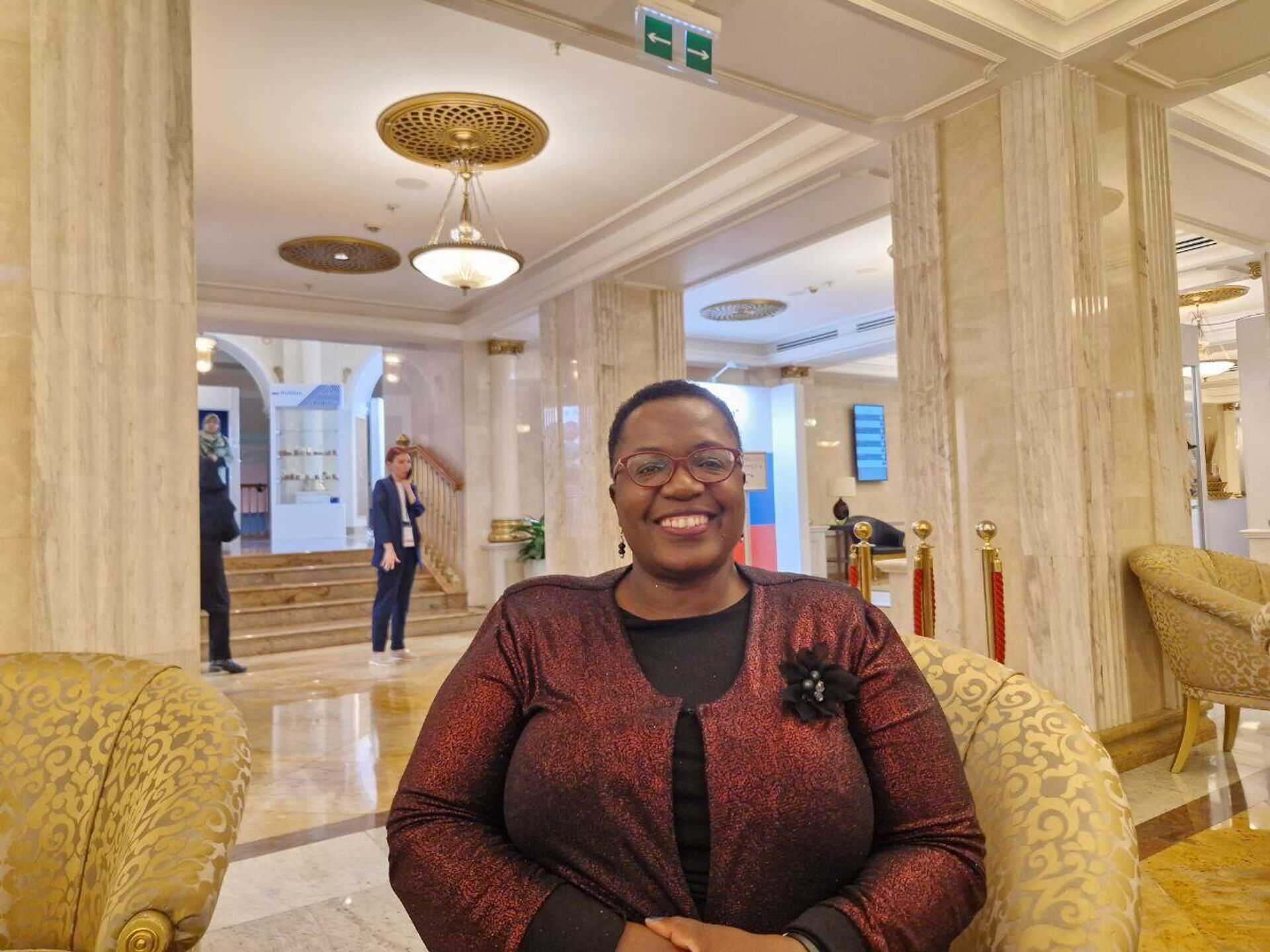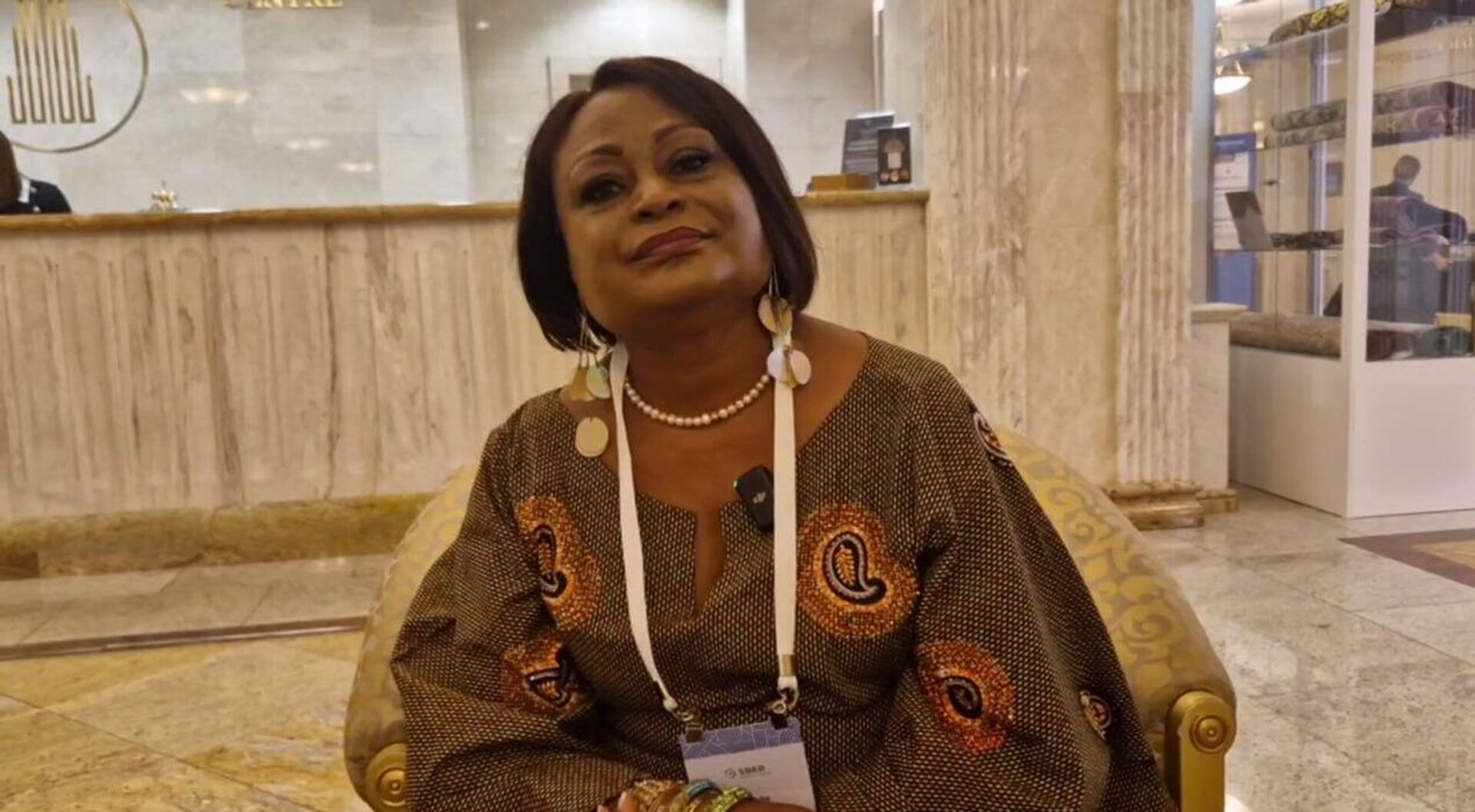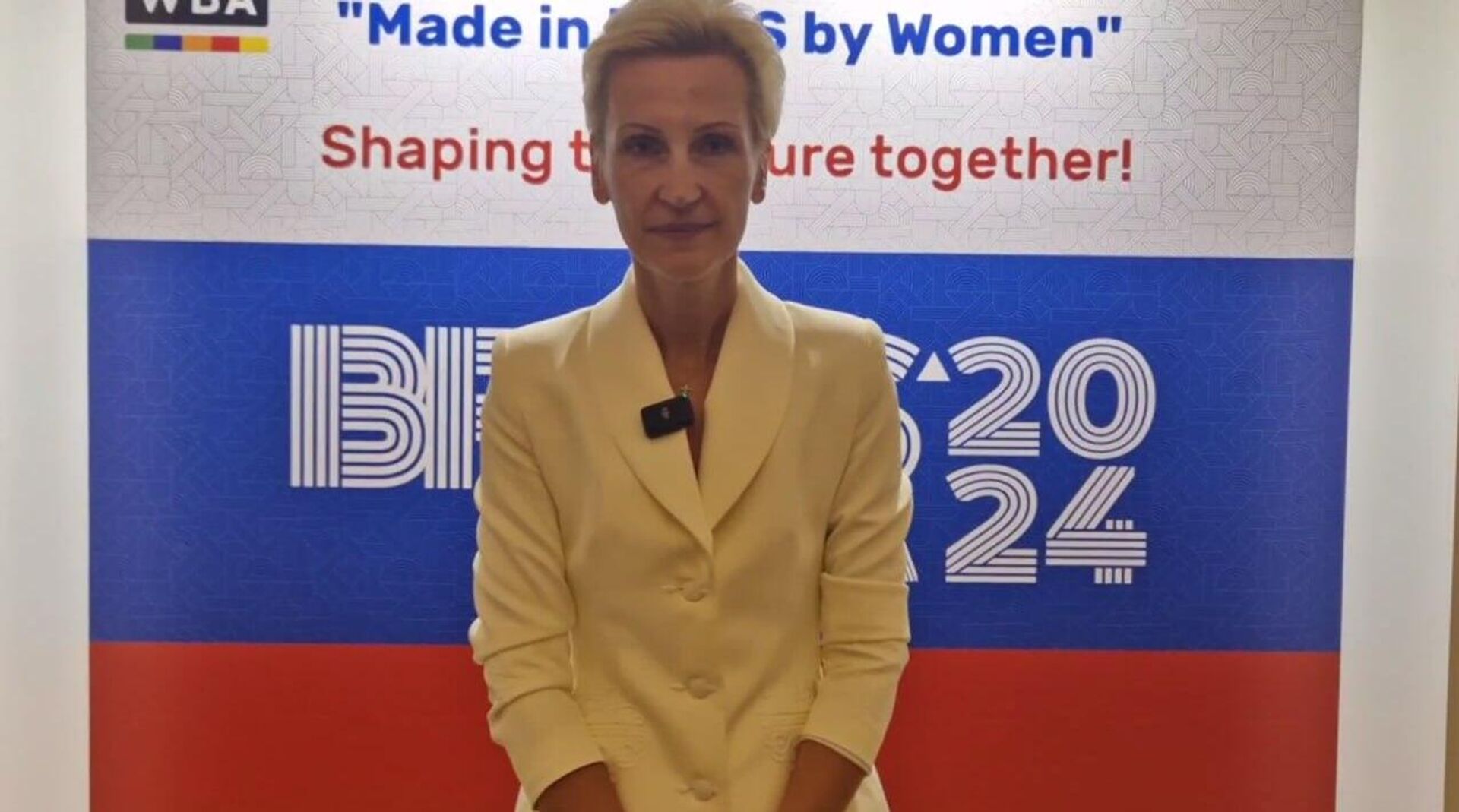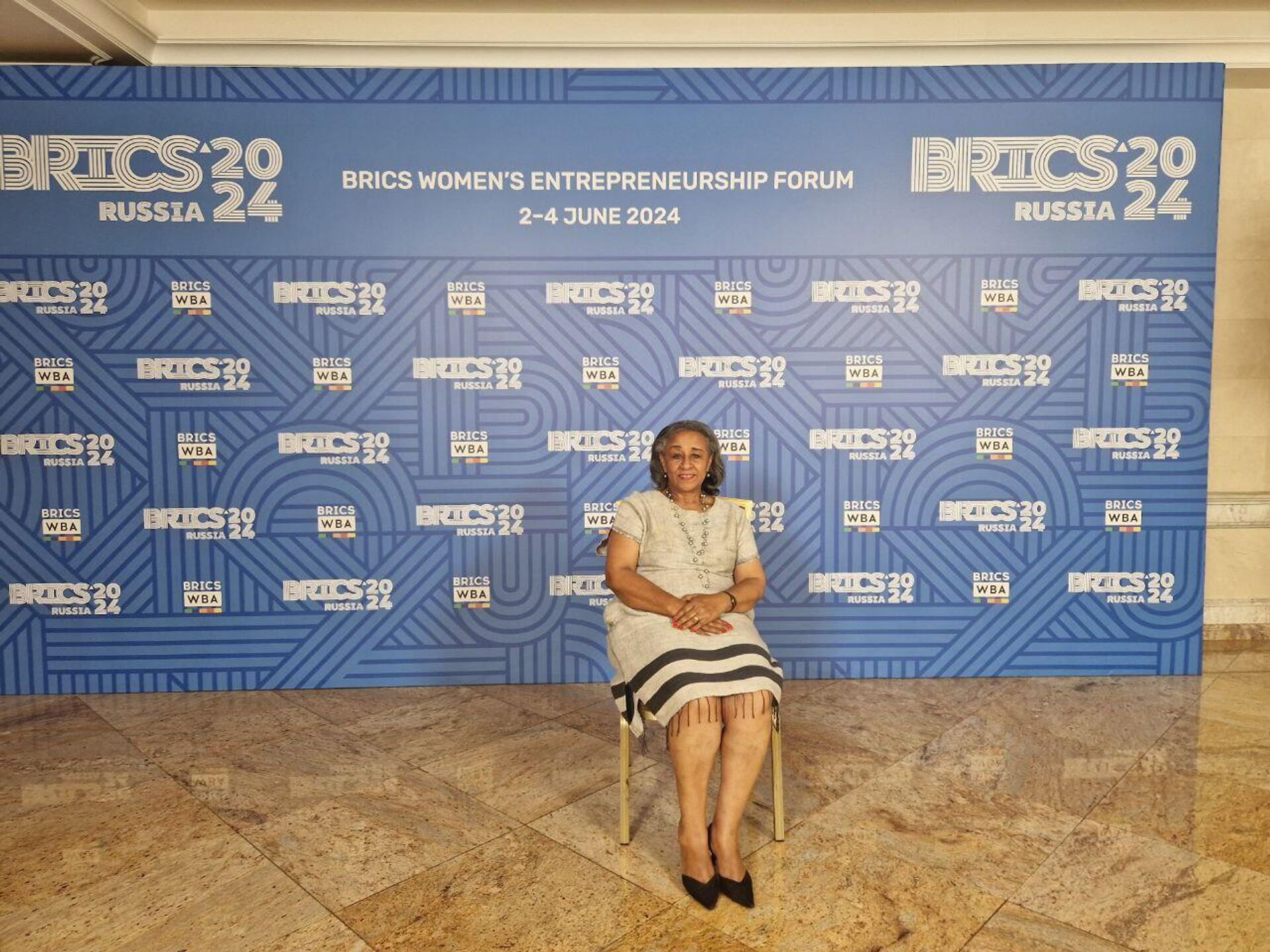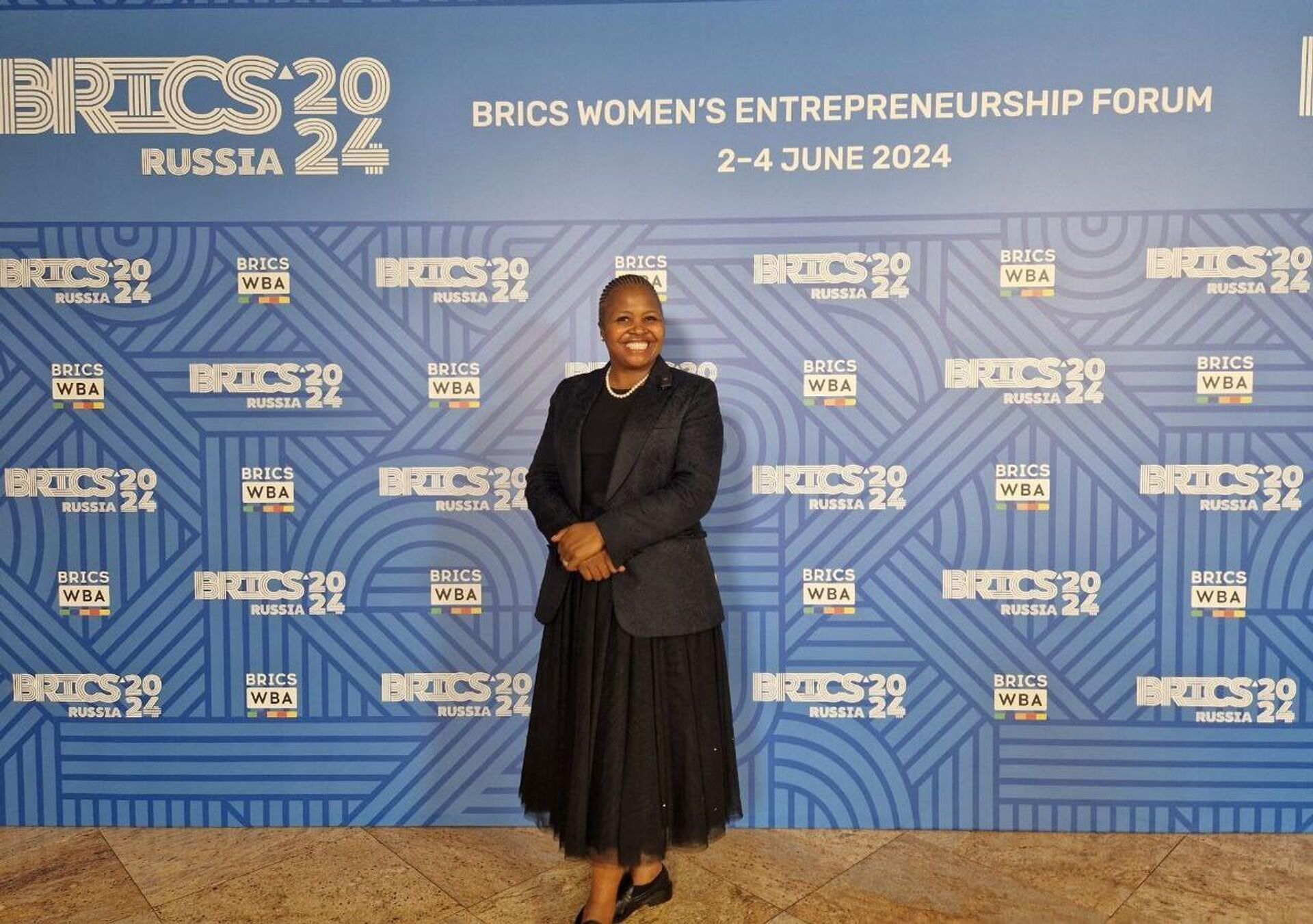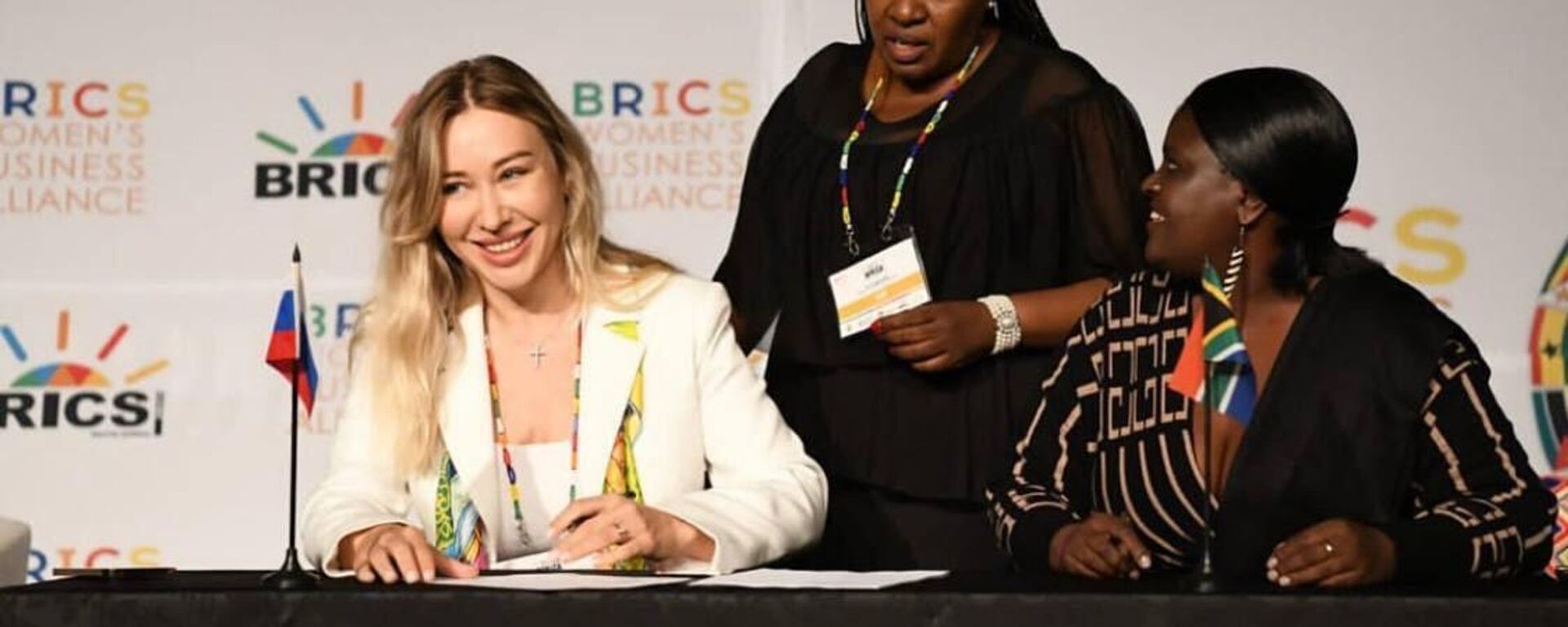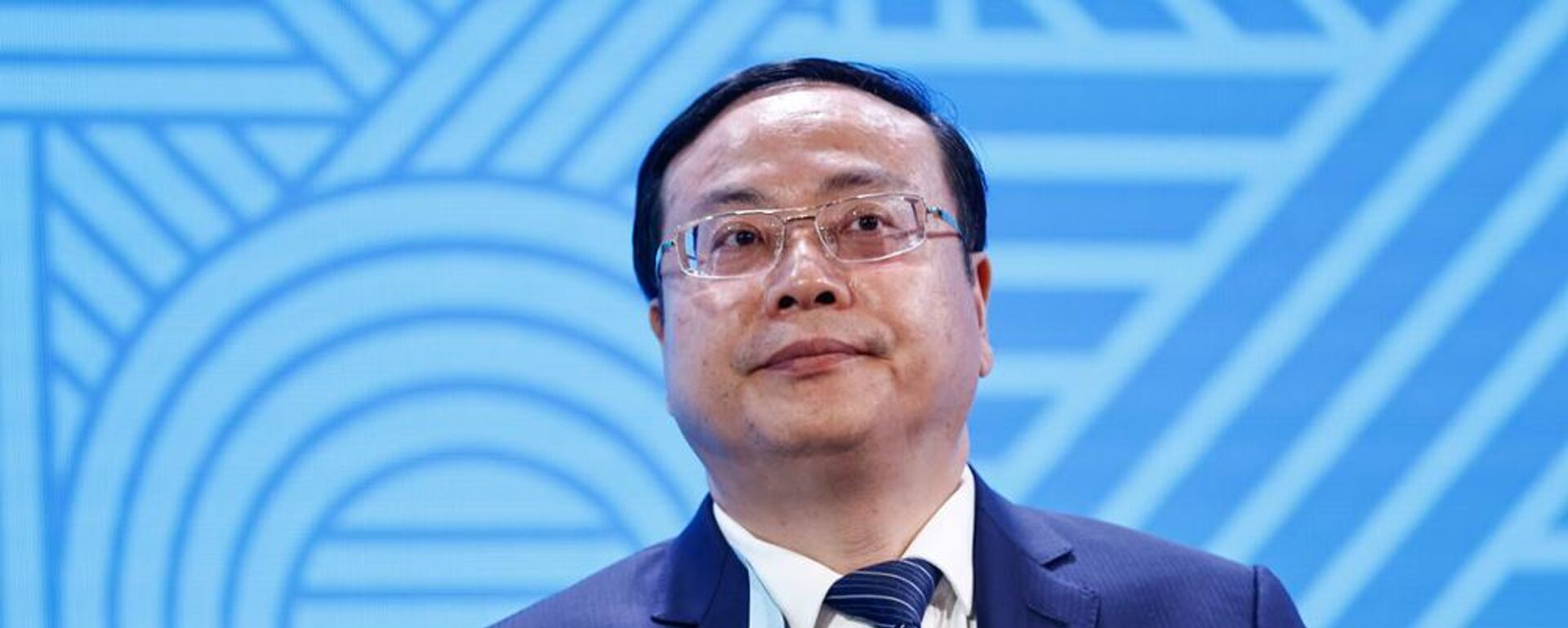https://en.sputniknews.africa/20240604/diversity-in-uniqueness-moscow-holds-brics-womens-entrepreneurship-forum-1066872400.html
United by Diversity: Moscow Holds BRICS Women's Entrepreneurship Forum
United by Diversity: Moscow Holds BRICS Women's Entrepreneurship Forum
Sputnik Africa
The first BRICS Women's Entrepreneurship Forum, organized by the BRICS Women's Business Alliance (WBA), took place in Moscow on June 2-4. The event brought... 04.06.2024, Sputnik Africa
2024-06-04T14:57+0200
2024-06-04T14:57+0200
2024-06-04T15:17+0200
opinion
emmerson mnangagwa
russia
west
zimbabwe
brics
sputnik africa
brics women's business alliance
sanctions
finance
https://cdn1.img.sputniknews.africa/img/07e8/06/04/1066874051_0:120:1280:840_1920x0_80_0_0_d9315becdd57d915d645be6de3a2e2d8.jpg
BRICS Women's Business Alliance can serve as a voice to speak “undiluted” truth, Nonkululeko Mantula, Communications Chairwoman of the South African Alliance branch, the CEO of Global South Queens Media House and SABC Radio Broadcaster, told Sputnik Africa.She added that the West has been spreading misinformation “of what really happens on the ground” and “sanctioning the voices of people.”According to Mantula, BRICS and the BRICS Women's Business Alliance in particular can become platforms where journalists are not threatened, mummed, or sidelined when they want to speak the truth.However, the bloc can serve not only as the voice for media representatives, but also as a geopolitical and economic pathway for the Global South free from the West’s influence, according to the chairwoman.Thus, she said, it is time to embrace the work the bloc has been doing for the Global South in an “economically viable and powerful” way.Mantula also highlighted the importance of trade in local currencies within the BRICS.In her message to Sputnik Africa's readers, Mantula touched on the hot topic of identity. She called on everyone to be proud of who they are: now is the time for Africans to be proud sons and daughters of African soil, Russians should be proud of being Russian, Chinese — of being Chinese and so on. Moreover, BRICS will help even with this.Moving on, Sputnik Africa also talked to Mandas Marikanda, CEO of Zimbabwean Women's Micro-Finance Bank, about her organization and, of course, how the cooperation within BRICS can help this project.The Women's Bank is a project of the government of Zimbabwe that was proposed as early as 1983, but it was only established in 2018 under the leadership of President Emmerson Mnangagwa, the CEO explained. The launch of the bank was driven by the goal of promoting gender equality, and it was done in partnership with the United Nations.What's also important is that the bank's motto is collaboration and not competition.So, what can BRICS do for the bank? The bloc presents new opportunities for “excluded” economies that are under sanctions, and, by doing that, it also facilitates women empowerment, Marikanda reckoned.Talking about Western punitive measures, one can recall that Russia is now the most sanctioned country globally, while Zimbabwe has been under restrictions for over 20 years. Marikanda found it "unfair" that the West tries to play an “umpire” that “jurors” the rest of the world.What's dangerous about these sanctions is that they sometimes bring death to ordinary people when, for example, necessary medicines are blocked from being imported to certain countries — just as it happened with Zimbabwe at some point.However, the country managed to solve this kind of issues.Marikanda called both Russia and China “all-weather friends,” adding that sanctioned countries “learn one thing: [to] value friendship.”Coming back to the topic of BRICS, Kutemba Konga, chairwoman of BRICS WBA's Zambia chapter, told Sputnik Africa that the bloc facilitates knowledge and expertise exchange.The alliance is like a “platform” where it is possible to “promote women's participation in the economic corridors,” she said.Speaking of women in BRICS, Anna Nesterova, head of Russian chapter of the BRICS WBA, revealed to Sputnik Africa that the “ultimate goal” of her organization is to get 50% of women entrepreneurship in the bloc.She also emphasized that, despite the fact that the alliance consists of women from other countries, they are all united by culture, traditions, and education.Furthermore, the CEO reminded that it was Russia that initiated the BRICS WBA to promote entrepreneurship among women, as the country has “a strategy in the interests of women.”And giving women greater economic autonomy means that they will give back more to their communities, Nigest Haile, Founder and Executive Director of the Centre for Accelerated Women’s Economic Empowerment, echoed Nesterova.She reminded that about 50% of the bloc’s populations are women and urged governments to support such a significant human resource.Such support should be in the form of access to finance, knowledge and information, and working premises.BRICS Women's Business Alliance is part of such the environment that can “collectively improve the economy,” Tsakani Masia, Queen of South Africa's Ha Masia, Venda Nation, told Sputnik Africa.The Queen stressed that despite coming from different nations and having different backgrounds, women can “learn from each other's countries.”The BRICS Women's Business Alliance is an association of women entrepreneurs from the BRICS countries aimed at promoting women's entrepreneurship and increasing their participation in the economic processes of the member countries.
https://en.sputniknews.africa/20240603/brics-womens-business-alliance-launches-common-digital-platform-1066857551.html
https://en.sputniknews.africa/20240524/doing-our-best-how-can-brics-members-help-africa-1066724076.html
russia
west
zimbabwe
southern africa
south africa
zambia
ethiopia
east africa
Sputnik Africa
feedback@sputniknews.com
+74956456601
MIA „Rossiya Segodnya“
2024
Christina Glazkova
https://cdn1.img.sputniknews.africa/img/07e7/0b/07/1063380906_0:0:673:674_100x100_80_0_0_79628b4d0cd9f29291a57aa13bbf9e7a.jpg
Christina Glazkova
https://cdn1.img.sputniknews.africa/img/07e7/0b/07/1063380906_0:0:673:674_100x100_80_0_0_79628b4d0cd9f29291a57aa13bbf9e7a.jpg
News
en_EN
Sputnik Africa
feedback@sputniknews.com
+74956456601
MIA „Rossiya Segodnya“
Sputnik Africa
feedback@sputniknews.com
+74956456601
MIA „Rossiya Segodnya“
Christina Glazkova
https://cdn1.img.sputniknews.africa/img/07e7/0b/07/1063380906_0:0:673:674_100x100_80_0_0_79628b4d0cd9f29291a57aa13bbf9e7a.jpg
emmerson mnangagwa, russia, west, zimbabwe, brics, sputnik africa, brics women's business alliance, sanctions, finance, business, women, southern africa, south africa, zambia, ethiopia, east africa, economy, russia-africa cooperation, cooperation, bank, global south, africa in details
emmerson mnangagwa, russia, west, zimbabwe, brics, sputnik africa, brics women's business alliance, sanctions, finance, business, women, southern africa, south africa, zambia, ethiopia, east africa, economy, russia-africa cooperation, cooperation, bank, global south, africa in details
United by Diversity: Moscow Holds BRICS Women's Entrepreneurship Forum
14:57 04.06.2024 (Updated: 15:17 04.06.2024) Christina Glazkova
Writer / Editor
Longread
The first BRICS Women's Entrepreneurship Forum, organized by the BRICS Women's Business Alliance (WBA), took place in Moscow on June 2-4. The event brought together more than 300 delegates from 30 countries. Sputnik Africa spoke with some participants on BRICS-Africa relations, women's role in the bloc and much more.
BRICS Women's Business Alliance can serve as a
voice to speak “undiluted” truth,
Nonkululeko Mantula, Communications Chairwoman of the South African Alliance branch, the CEO of Global South Queens Media House and SABC Radio Broadcaster, told
Sputnik Africa.She added that the West has been spreading misinformation “of what really happens on the ground” and “sanctioning the voices of people.”
“What we now need to do is become those citizens and those journalists and those media practitioners who speak the truth undiluted, unfiltered and without any bias for the West or even the South, but give our societies, our communities in the Global South the real voice, the real truth about what's happening,” she said.
According to Mantula, BRICS and the BRICS Women's Business Alliance in particular can become platforms where journalists are not threatened, mummed, or sidelined when they want to speak the truth.
However, the bloc can serve not only as the voice for media representatives, but also as a geopolitical and economic pathway for the Global South free from the West’s influence, according to the chairwoman.
“BRICS has been [a voice] for women, for men, for children in the Global South. We've never had economies that run on their own. All the economies have been dependent and reliant on the Western systems. […] We can see how the Western systems can hinder us, should we not play according to their tune,” Mantula told Sputnik Africa.
Thus, she said, it is time to embrace the work the bloc has been doing for the Global South in an “economically viable and powerful” way.
Mantula also highlighted the importance of trade in local currencies within the BRICS.
“The use of local currencies or local commodities […] now brings back power to the BRICS countries. Within the BRICS bloc, we do have a lot of commodities that we can trade amongst ourselves,” she noted.
In her message to
Sputnik Africa's readers, Mantula touched on the hot topic of identity.
She called on everyone to be proud of who they are: now is the time for
Africans to be proud sons and daughters of African soil, Russians should be proud of being Russian, Chinese — of being Chinese and so on. Moreover, BRICS will help even with this.
“BRICS has opened up that platform for us to be able to be proud of who we are. [...] we've got a vehicle, BRICS, that is saying, 'We are ready to change the status quo.' Don't give up on your dreams. Don't give up on your countries. Don't run to other countries that promise you something, but steal from who you are, your core. [...] The world is looking for [...] our uniqueness. And, in our uniqueness there is diversity, but there's also a way for us to work together so that we can make a better world for the future,” she concluded her inspiring message.
Moving on, Sputnik Africa also talked to Mandas Marikanda, CEO of Zimbabwean Women's Micro-Finance Bank, about her organization and, of course, how the cooperation within BRICS can help this project.
The Women's Bank is a project of the government of Zimbabwe that was proposed as early as 1983, but it was only established in 2018 under the leadership of President
Emmerson Mnangagwa, the CEO explained. The launch of the bank was driven by the goal of promoting gender equality, and it was done in partnership with the United Nations.
“The Women's Bank is relevant to the BRICS communities because exclusion is a language that is known across all kinds of cultures. It's known across all continents. There will always be poor people elsewhere. But should they remain like that? No. Someone needs to make an effort to reach out,” Marikanda said.
What's also important is that the bank's motto is collaboration and not competition.
“We smile with everyone. We are an enemy to no one. That's what our president says. Our president says, a friend to all and an enemy to none. This generation can do better with smiling faces and more solutions than fighting against each other. And that's what women stand for. That's what the Women's Bank is there for,” the speaker emphasized.
So, what can BRICS do for the bank? The bloc presents new opportunities for “excluded” economies that are under sanctions, and, by doing that, it also facilitates
women empowerment, Marikanda reckoned.
“When it comes to microfinance, we know that when you work with women, you impact more lives. [...] And [the] Women's Bank is proud to be one of the advent and the leading banks to be working with this agenda for the BRICS countries,” she added.
Talking about Western punitive measures, one can recall that Russia is now the most sanctioned country globally, while Zimbabwe has been under restrictions for over 20 years. Marikanda
found it "unfair" that the West tries to play an “umpire” that “jurors” the rest of the world.
What's dangerous about these sanctions is that they sometimes bring
death to ordinary people when, for example, necessary medicines are blocked from being imported to certain countries — just as it happened with
Zimbabwe at some point.
“The worst ones are not those who kill with a gun, but those who make policies and laws that they know at the end of the day the ultimate result is someone is going to die,” the speaker argued.
However, the country managed to solve this kind of issues.
“We have found that there is beauty in homegrown solutions. There is beauty in collaborating with the entities that are going through the same. So we appreciate and understand what Russia is going through. [...] People do not talk about the death, the number of people who died, the lost opportunities, potential that is crushed because someone decides that 'we don't want you to go there',” the bank's CEO said.
Marikanda called both
Russia and China “all-weather friends,” adding that sanctioned countries “learn one thing: [to] value friendship.”
“It's their [the West's] choice. Our choice is to make a difference. We choose to live. We choose to collaborate. We choose to partner. That's what brings us to Russia. And we know you're made strong. We made it stronger,” she concluded.
Coming back to the topic of BRICS,
Kutemba Konga, chairwoman of BRICS WBA's
Zambia chapter, told
Sputnik Africa that the bloc facilitates knowledge and expertise exchange.
“There's a lot of expertise in BRICS that we feel our women can benefit from because we are still in a developing economy, the other people are already sort of advanced,” she said.
The alliance is like a “platform” where it is possible to “promote women's participation in the economic corridors,” she said.
“So, in finding collaborations and cooperation with the women in BRICS, we can be able to improve our assets,” Konga noted, adding that cultural diversity can help education in business, and be the “synergy, as a tool to do business.”
Speaking of women in BRICS,
Anna Nesterova, head of Russian chapter of the BRICS WBA, revealed to
Sputnik Africa that the “ultimate goal” of her organization is to get 50% of women entrepreneurship in the bloc.
“We created the WBA to get this point up, and to create this new level of women entrepreneurship and BRICS. It's not only entrepreneurship. We also create a new role model for women,” Nesterova, who is also the head of Working Group on Innovative Development and founder of Watchmaking Manufacturer Palekh Watch, said.
She also emphasized that, despite the fact that the alliance consists of women from other countries, they are all united by culture, traditions, and
education.Furthermore, the CEO reminded that it was Russia that initiated the BRICS WBA to promote entrepreneurship among women, as the country has “a strategy in the interests of women.”
And
giving women greater economic autonomy means that they will give back more to their communities,
Nigest Haile, Founder and Executive Director of the Centre for Accelerated Women’s Economic Empowerment, echoed Nesterova.
She reminded that about 50% of the bloc’s populations are
women and urged governments to support such a significant human resource.
“Investing in women is smart and beneficial to each of our BRICS countries. I encourage governments to support women because women have multiple roles. They are not only in business as men are, but they have other multiple responsibilities, including being mothers, […] wives, community caretakers,” she told Sputnik Africa.
Such support should be in the form of access to finance, knowledge and information, and working premises.
“[Women] really have to be supported in paving ways on conducive business environment where trade information can reach them easily, where trainings can get organized very close to them so that they don't have to leave their houses and children aside and not miss opportunities like these,” she said.
BRICS Women's Business Alliance is part of such the environment that can “collectively improve the economy,”
Tsakani Masia, Queen of South Africa's Ha Masia,
Venda Nation, told
Sputnik Africa.“So these meetings assist us to come up with solutions as women because, as women, we can drive the economy of our countries, coming from different countries,” she said.
The Queen stressed that despite coming from different nations and having different backgrounds, women can “learn from each other's countries.”
“You will see how the economy will change because we are very good at leadership as women. So there's a saying that says. When you empower a woman, you empower the nation,” she concluded.
The
BRICS Women's Business Alliance is an association of women entrepreneurs from the BRICS countries aimed at promoting women's entrepreneurship and increasing their participation in the economic processes of the member countries.
